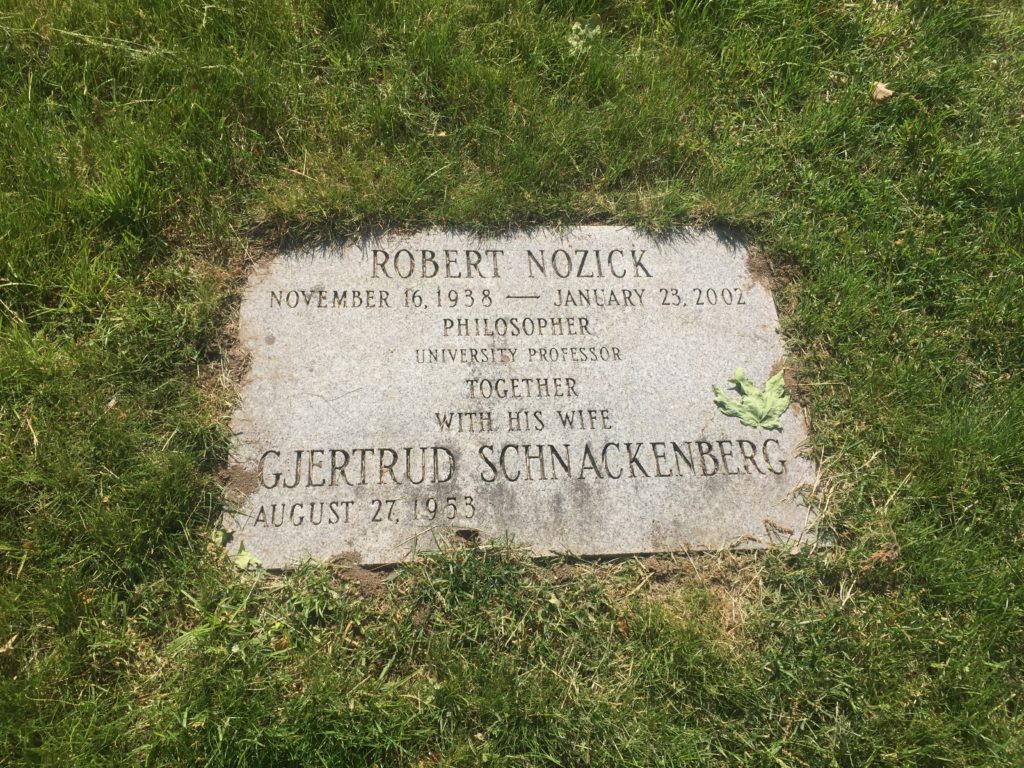Erik Visits an American Grave, Part 665
This is the grave of Robert Nozick.

One the most influential thinkers in the noxious cancer known as libertarianism, Nozick was born in Brooklyn in 1938 to a pretty average Jewish family. His father was an immigrant from Russia who owned a small business. Nozick went to local Brooklyn schools and then went on for an undergraduate degree at Columbia and a PhD at Princeton, which he achieved in 1963. In his younger life, Nozick was sympathetic to leftist causes. He was a follower of Norman Thomas for awhile and a member of the Students for a Democratic Society in its early years. But he converted to libertarianism while at Princeton, influenced by Murray Rothbard, an economist who promoted an individualistic anarchism that Nozick found appealing. He then began reading such horror shows of thinkers as Friedrich Hayek and Milton Friedman.
Under Rothbard’s tutelage, Nozick became highly concerned about how the state had developed to manage the post-Great Depression and World War II world. The large managerial state now encompassed far more of society–in America and abroad–than the 19th century state. For Nozick, that state became a threat to liberty. These concerns culminated in his influential 1974 book Anarchy, State, and Utopia. He wrote this as a rebuttal to his equally influential Harvard colleague John Rawls’ 1971 book A Theory of Justice, which fought against the idea of inequality. Nozick was more concerned with how a state might infringe on liberty. To him, the only functions of a state were “limited to the narrow functions of protection against force, theft, fraud, enforcement of contracts, and so on.” In other words, the protection of property. He built on the Lockean state of nature to determine whether a state should exist at all, noting that of course it should, but that it should be as close to that state of nature as possible. More to the point, this was a direct attack on the American welfare state that had forcible redistribution of income, as limited as it was even in the 1970s, that made people fund social programs they did not support. Given how much of this is racialized in the United States, Nozick was giving succor to those who opposed what it would take to fight racial equality in this nation, not to mention class equality. Unfortunately, the book won the National Book Award.
Now, I will be the first to admit that philosophical abstract arguments in general bore me and so many of you are far more qualified to discuss the details of Nozick’s thinking than I. Please feel free to do so–and correct any mistakes I have made–in comments.
Not surprisingly, Nozick became a favorite of the Republican elite class. His work openly excused significant level of inequality because it prioritized the idea of free exchange between consenting adults. To me, this is frighteningly close to Gilded Age contract doctrine, which effectively put Andrew Carnegie and a Polish immigrant on the same level, saying they both freely agreed to the job where the immigrant worked 12 hour days in dangerous conditions. He even went so far as to argue that adults should be able to enter into consensual slave contracts, though to me that seems inherently contradictory.
Nozick followed this up with 1981’s Philosophical Explanations, the explanation of which is completely incomprehensible to me. In 1989, he sort of reconsidered his libertarianism in The Examined Life, which was pitched to a general audience and where he finally made some connections between income redistribution and freedom. But he never could get to the idea that the government should be able to coerce people to do much of anything. His whole life seems like a justification against the government forcing people to wear masks during a pandemic and I wonder what he would have said about it if he was still alive.
Nozick came down with stomach cancer and died in 2002, at the age of 63.
Robert Nozick is buried in Mount Auburn Cemetery, Cambridge, Massachusetts. Eventually Gjertrud Schnackenberg, the semi-famous poet and his second wife, presumably will join him.
If you would like this post to visit other American philosophers, you can donate to cover the required expenses here. I am sure I will do a very poor job on these posts, as I usually do with philosophers. Josiah Royce is in Cambridge, Massachusetts and Alain LeRoy Locke is in Washington, D.C. Previous posts in this series are archived here.


